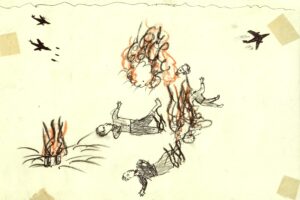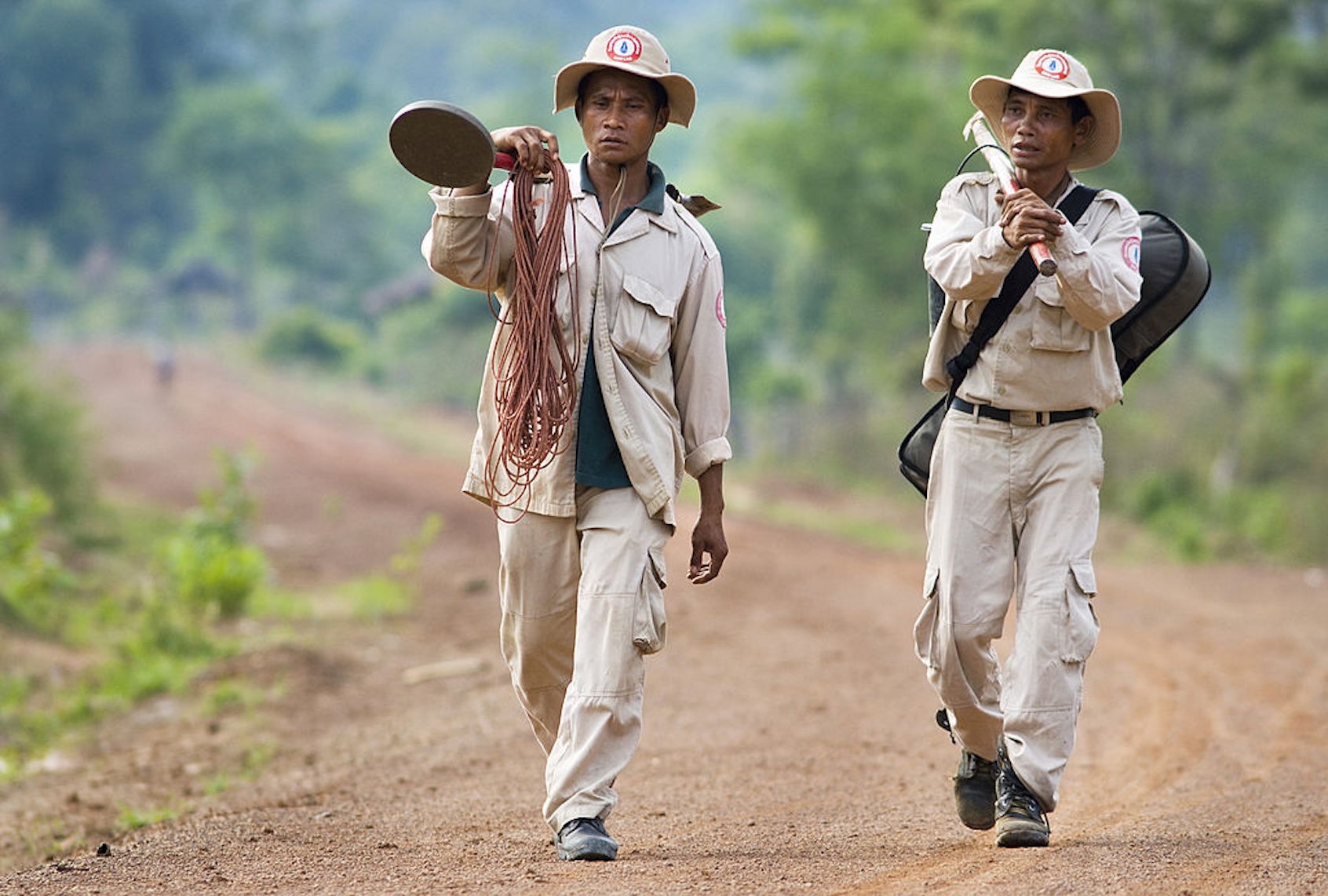This September marks 80 years since the end of World War II. Even at that distance, we are still feeling its legacy. In August, authorities discovered a 250-kg World War II bomb during construction in Stuttgart, Germany, my father’s ancestral homeland. Nearly 1,000 residents were evacuated, train traffic was halted and order was restored only after the device was safely defused.
Around the same time in southern Laos, my mother’s home province of Champasak, a farmer was out in the field working with his two small children when he struck an unexploded bomb leftover from the American Secret War in Laos that took place between 1964 and 1973, when over 2.5 million tons of ordnance were dropped on Laos — more than all the bombs dropped on Germany and Japan combined during World War II. The farmer died instantly, and his son was left with injuries. In Laos, warnings of unsafe land due to unexploded ordnance (UXO) are passed down from generation to generation. Parents and leaders caution children to stay on the path and not to stray off. “Don’t play with bombies,” they say, and “Don’t dig where it’s not safe.” But there is no context for these children and their parents for how these bombs ended up in their land. They were dropped on Laos decades before they were born.
The bombs beneath the soil are reminders of wars that I know too little about.
Between 1940 and 1945, Allied forces dropped about 1.4 million tons of bombs on Germany. Stuttgart alone was hit with over 53 air raids, leaving 68% of the city reduced to rubble. An estimated 15% did not explode on impact, which has resulted in nearly 2,000 tons of World War II munitions being found annually across Germany. The case in Stuttgart illustrates this ongoing emergency response in a developed country: Evacuations, civil protection, public outreach, interruptions to daily life — all orchestrated with logistical precision.
Germany has worked to address this crisis in their own country and around the world as a disarmament leader. A founding state party to the Ottawa Convention, the treaty that sought to ban anti-personnel landmines around the world, it had destroyed 1.7 million anti-personnel mines by 1997. Germany invests heavily in mine-action globally, including €70 million in 2023, across 11 countries.
In Laos, the legacy of war is even more hidden, yet deadlier. During the American Secret War, there was an indiscriminate bombing on civilians of Laos — at least one ton of ordnance dropped for every child, woman and man living in Laos during the 1960-70s.
In Laos, the legacy of war is even more hidden, yet deadlier. During the American Secret War, there was an indiscriminate bombing on civilians of Laos — at least one ton of ordnance dropped for every child, woman and man living in Laos during the 1960-70s. Cluster munitions were the main ordnance deployed. Over 270 million were used, with up to 30% of the submunitions failing to detonate. Today, over 50 years later, only 10% of land contaminated by these and other munitions has been cleared. Families in Laos continue to lose lives and limbs; they live in fear of farming their fields or playing in their backyards.
What is tragic about these realities is that with at least one-third of land in Laos contaminated with UXO, it is nearly impossible to put life on hold until it is safe. Families across the country are doing their best to survive and give their children a childhood. Over the last decade in Laos, over 48% of casualties from UXO were children. So far in 2025, there have been a reported five deaths and nine injuries due to explosive ordnance.
Want more sharp takes on politics? Sign up for our free newsletter, Standing Room Only, written by Amanda Marcotte, now also a weekly show on YouTube or wherever you get your podcasts.
Despite being the largest funder of global demining, with nearly $400 million allocated to demining activities in Laos since 1995, the U.S. spent at least $50 billion in 2025 currency to bomb Laos over nine years. After 30 years of commitment and growing support to address the UXO crisis, in 2025 the U.S. paused all funding on foreign aid — including life saving funds used to clear bombs in Laos. Though funding has now resumed, it is unclear what the future of U.S. funding will be to clear the very bombs it dropped on Laos, and to support the victims of explosive ordnance.
My mother fled Laos as a refugee during the bombings, a fact that, in turn, led me to learn more about my father’s ancestors in Stuttgart and what they might have faced. As a Lao German American, I carry these histories in my body, and they are the reason I now work with Legacies of War, an organization dedicated to raising awareness of America’s role in Laos and to mobilizing communities to call on Congress to sustain funding for bomb clearance and survivor support.
What lessons must we learn to stop the indiscriminate bombing of civilians, which continues to devastate generations from Gaza to Ukraine to Congo? The haunting parallel between Laos and Germany reminds us that wars never really end when the fighting stops. They live on in the ground itself, demanding generations of courage and resources to undo.
We need your help to stay independent
The U.S. Campaign to Ban Landmines-Cluster Munition Coalition leads the call for the U.S. to accede to the Mine Ban Treaty and the Convention on Cluster Munitions (CCM), which would result in the destruction of all stockpile, manufacturing, transfer and use of indiscriminate weapons like anti-personnel landmines and cluster munitions. Signed by 111 states parties, the CCM is threatened by Russia’s war in Ukraine and growing global conflict. Lithuania left the Convention on March 6, and others have voiced their plans to leave the treaty.

(Courtesy of Legacies of War) “But just then the bombs fell down on their heads…”
We must center survivor stories and continue to share our memories. A witness of the American bombings on Laos drew a harrowing illustration and wrote, “Then they heard a loud sound of guns so the three, father and children in one family hurried forward searching to find a hole in which to flee from the falling bombs in the sky. But just then the bombs fell down on their heads before they could get into the holes. This and the lives of one family from my village in Xieng Khouang, they lost their lives in this way. Is there anyone who knows and sees the pity for and with them?”
We owe it to those still living under the shadow of buried bombs to act with urgency and hold true to our commitments. In Laos, in Germany and in so many other places around the world, the ground still explodes beneath people’s feet. Congress and leaders around the world must match local resilience with political will. Only then can we begin to write an ending to wars that refuse to end themselves.
Read more
about this topic


